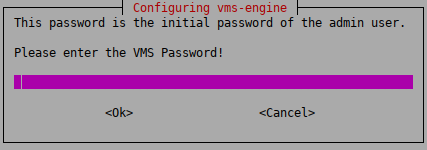4.1.5. Procedure – Configuring Management Server (MS)
Purpose:
To configure Management Server, complete the following steps.
Steps:
Configure the site name.
The hosts managed by MS are organized into sites. Use a descriptive name for the site, for example, the name of the company. This will help the administrator distinguish MSs from each other. Enter the site name.
Configure the hostname of the MS Engine.
It is recommended to enter the normal hostname, but do not use FQDN. The default value is
VMS-Host.Warning Make sure to enter the correct hostname, because it is stored in the MS database and is complicated to modify later.
Configure the initial password of the administrator user on MS.
Enter the MS administrator password. This password is used to login to MS from the Management Console as an administrator, and configure the PNS firewalls. The username of the administrator by default is
admin, which can be modified later. The password can be changed later at any time.Note Make sure to create a password that conforms to the secure password generation standards of your organization.
Store the password in a secure way.
Configure the Certificate Authority of MS.
Enter a secure password for the Certificate Authority (CA) of MS. This password will be used as the passphrase of the initial CA certificate.
Note Make sure to create a password that conforms to the secure password generation standards of your organization.
Store the password in a secure way.
Warning Make sure to enter the correct CA password. It is difficult to change the CA password later and requires regenerating the whole CA chain.
Create the root Certificate Authority.
MS includes public key infrastructure (PKI) management to ensure that each element of the firewall system (MS module, VPNs, users) can be authenticated with X.509 certificates. During this stage of the installation the root CA is created and configured. Provide the following parameters.
Warning Do not use accented characters. They are not supported in the X400/X500 standard.
: two characters only. For example,
US,DE,HU.: Optional. United States (
US) only. For example,Nevada.: Optional. For example,
Las Vegas.: Optional. For example,
Example Ltd..: Optional. For example,
IT department.
Copyright: © 2021 Balasys IT Security
Send your comments to support@balasys.hu







